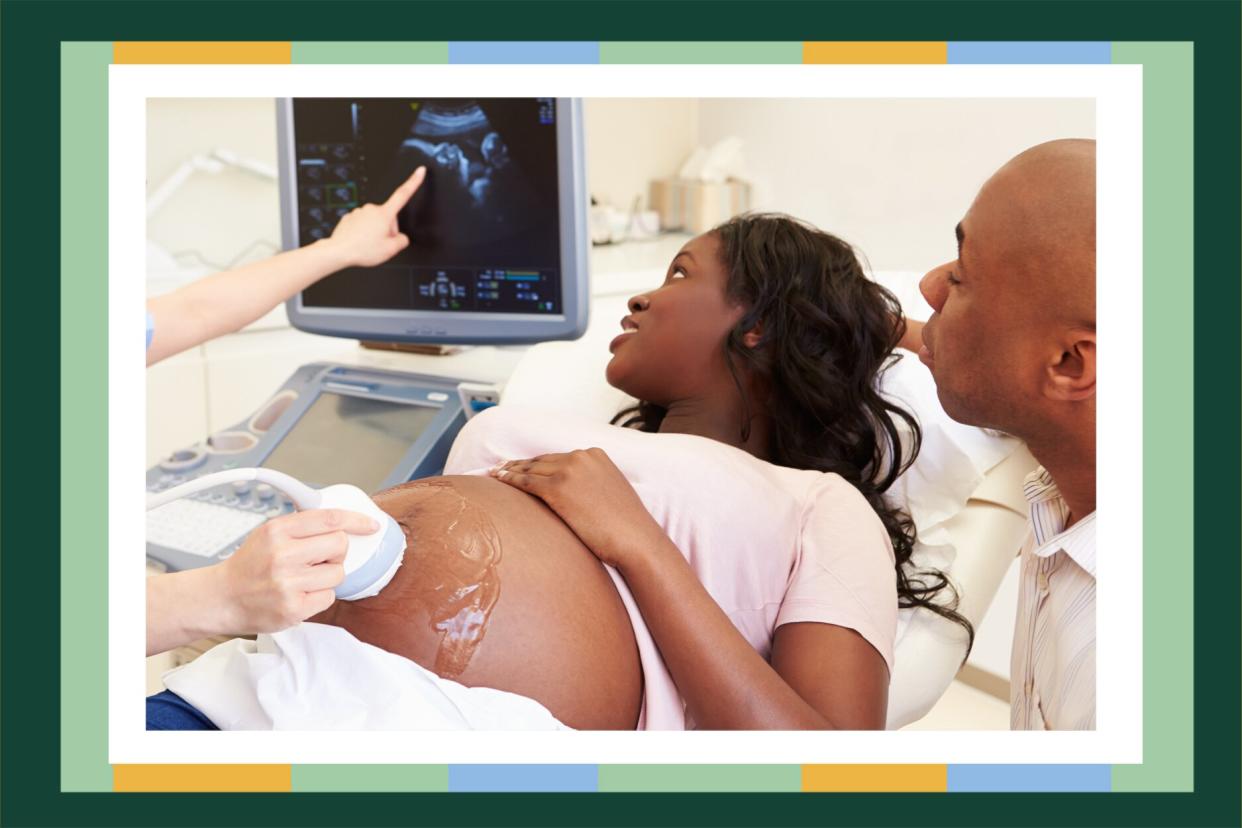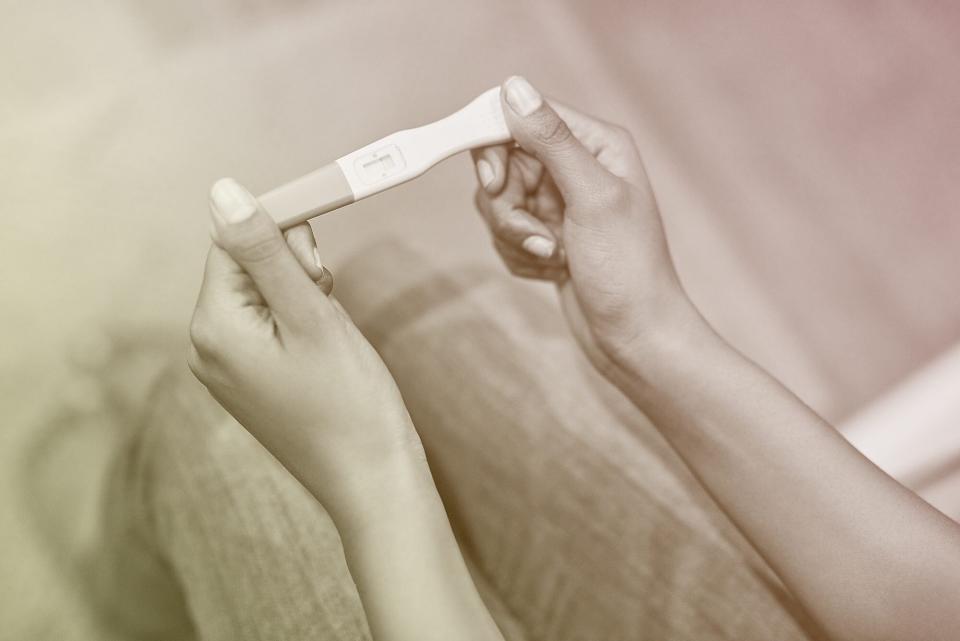For Black Moms, Childbirth is More Dangerous and More Expensive

Getty Images
Like most healthcare in the United States, pregnancy care can be expensive. After all, with both pregnancy and delivery, there's an element of risk. And the maternal mortality rate in this country continues to rise. According to the CDC, in 2019 there were 20.1 deaths per 100,000 live births—that's significantly higher than in 2018, when there were 17.4 deathe per 100,000. But when the pregnant people in question are Black? That maternal mortality number triples.
The factors driving this tragedy are complex and systemic, but solutions exist—solutions that can save the lives of Black birth parents. So why aren't we using them? Quality health insurance is a prerequisite for accessing good medical care. Without access to this, Black folks are forced to pay out of pocket for maternal services that are not covered or forgo them while suffering the consequences. According to Health Affairs Journal, Vol 39, No. 3, "uninsurance rate among blacks and Hispanics is substantially higher than the rate among whites."
Related: Why Black Mothers & Babies Have the Worst Birth Outcomes in the Nation
The Cost of Pregnancy Care
Pregnancy care includes prenatal, perinatal and postnatal care. The average cost of childbirth through vaginal delivery in the US, with health insurance, is between $5000 and $11000 in most states—that is, barring any complications that could increase birth cost. With complications (such as a cesarean section), the cost of pregnancy care increases significantly—to between $7500 and $14500.
On top of that, Black folks are faced with hidden costs when they are unable to access health insurance. For example, some managed care plans will refuse to cover additional sonograms and medical devices. An abdominal sonogram without health insurance can cost between $200-$650 depending on provider and geographic location. Medical devices such as blood pressure machines and glucometers, which are needed to monitor preeclampsia and gestational diabetes, can cost upwards of $100 without health insurance. The result? Either the unsinsured—often Black—pregnant person's birth process is more expensive than a white person's, or they choose to forgo critical care entirely.
Related: American Birth Story: The Changing Face of Birth in America
According to provisions in the EMTALA law passed in 1986, a pregnant person presenting to the emergency room in labor cannot be denied care. That said, care during the actual childbirth is often the least of a birthing person's worries—particularly if they are Black. Prenatal and postnatal care are critical; most pregnant patients can access health insurance coverage through their employment, and birth parents who are unemployed may qualify for state-funded Medicaid to cover pregnancy-related expenses. Standard prenatal care will include tests, blood work and genetic screening, physical exams and ultrasounds. The extent of the testing and number of ultrasounds may be limited based on health insurance providers, who may at times require prior authorization.

ljubaphoto/Getty Images
But Who is Really Covered?
Since access to reliable and affordable health insurance is a key determinant in the quality and cost of care received in pregnancy, examining how said access impacts the Black community is relevant. Ivion Davis, FMP, DNP, who works at an urban health center in Brooklyn, tells Parents that "there is a gap in health insurance available to Black women that leads to sporadic care. Black women are more likely to have gaps in health insurance coverage due to loss of jobs and unemployment."
Related: What to Expect: Hospital Birth Costs
And those aren't the only extra barriers to accessing health insurance coverage in low-income communities. Requirements to qualify for health insurance always includes proof of income and residency. This places an additional burden on pregnant people who are unemployed or experiencing homelessness. Homeless persons make up 13% of the US population, and 40% of that population is Black. Plus, even simple things like how far away you live from a health facility are factors that disproportionately affect the Black community and are detrimental to accessing comprehensive maternal care.
Why Are Black Births More At-Risk?
Legally, a pregnant person presenting to the emergency room in labor cannot be denied care. That said, care during the actual childbirth is often the least of a birthing person's worries—particularly if they are Black.
Davis explains that, in her experience, "underserved Black women are more likely to have maternal complications as they are more prone to underlying and pre-existing health issues." These maternal co-morbidities require additional testing, medical equipment and surveillance that are often not covered by the insurer—or which require prior authorization. This can result in a delay in diagnosis and care, which can prove catastrophic. Black birth parents within the undocumented population are also at risk for increased maternal co-morbidities and maternal and infant death. This is because immigration status is another barrier to accessing health insurance. Needless to say, ignoring the maternal health needs of Black folks in the undocumented community is inhumane.
The gap in cost of care, which causes Black pregnant people to inadvertently pay more for maternal care simply because they represent the larger portion of uninsured individuals, exists because the average projected cost of a pregnancy differs from the average projected cost of a pregnancy with complications. These complications may arise from diagnoses such as diabetes, hypertension, or thyroid disease—all of which are prevalent in the Black community. Again, this is due in no small part to how systemic racism affects equity regarding health determinants.
Bottom line? Systemic racism and lack of access to preventative care can lead to complications during and after childbirth that can be both life-threatening and life-alteringly expensive—including but not limited to C-section and/or preterm labor that may result in extensive neonatal costs.
Pregnancy care is a human right

PeopleImages/Getty Images
The major determinants of health are economic stability, education access and quality, neighborhood and environment, and social and community context. When examining Black maternal health through these lenses, it's easy to see how systemic racism affects maternal outcomes. Dr. Lisa Gittens-Williams, M.D..PROF-PRAC, Director of Obstetrics, Gynecology and Reproductive Health at Rutgers New Jersey Medical School tells Parents that "completely out of the health insurance system and from a human rights perspective, access to maternal care is a human right."
Related: 8 Innovators Working for Real Changes to Maternal Health in America
The reality of care, however, is different. Coupled with the disadvantage regarding health determinants, there remains a challenge within the Black community when it comes to health literacy. Maternal co-morbidity and mortality rates are affected by how informed Black parents are about the importance of early and consistent maternal care. Dr. Lily Higgins of AmeriHealth Caritas tells Parents that "improving health literacy and self-advocacy skills can also help more Black women have healthy pregnancies, deliveries, and babies." A more informed pregnant patient leads to better self-care and better decision-making.
What are the solutions?
There exists a lack of understanding of how critical consistent maternal care is, for all pregnant people, and this is compounded by the lack of available patient navigation programs. This means that even when there are gaps in insurance coverage, there should be programs and support services that fill those gaps—from patient health advocacy services to accessible grant funding for Black birthing folks.
The main goal of patient navigation, specifically, is to identify the patient-level barriers to accessing health care, thereby reducing delays, providing health education and offering social support. Clark County Public Health (CCPH) implemented one such system after observing data showing a lower level of first-term prenatal care within Clark County when compared to national goals. Within the first year of implementation, 58 women enrolled and 96% of the patients received a referral to community resources and/or services. As for available funding, Baby Dove just launched a Black Birth Equity fund, to which the brand has pledged $250,000 of grant money to help Black birthing folks afford doula services—$1,300 in doula-fees grants to roughly 190 pregnant people.
The comprehensive care of a pregnant person is both segmented and interrelated. Through the lens of health equity, it is easy to see how Black folks are at a disadvantage when it comes to maternal care. An acknowledgement of the problem and a solution-based approach, such as incorporating widespread patient navigation programs and/or perinatal navigators and doulas, could provide a possible solution. Being deliberate about partnerships between community and the healthcare system—utilizing and funding trusted sources such as community health centers—is another tactic. Removing barriers that enable insurance carriers to delay access to life-saving treatment (an additional sonogram, medical equipment like a glucose monitor) is a simple yet effective way to make a difference.
The most critical drivers to reducing maternal mortality and birth expenses among the Black community? Reducing rates of infant prematurity and of unnecessary C-sections; doulas can be crucial in this endeavor as well.
Of course, passing laws that protect birthing people of all races are paramount, too. Dr. Gittens-Williams lauds the New Jersey S4111 legislation, which extends the length of postpartum coverage for Medicaid services to 180 days, about the first six months of an infant's life. This significantly improves health outcomes regarding treatment of illness diagnosed during pregnancy—plus, it provides support for new parents to manage postpartum symptoms, illness, or even postpartum depression or psychosis.
The effects of systemic racism on maternal care in the U.S. have reached a tipping point, and confronting them is long overdue. This is not only a social issue; it is an economic crisis as well. The earning potential of a Black birth parent can be seriously curtailed by an untreated illness that occurs during or immediately after pregnancy, resulting in loss of wages due to the parent's inability to work—or even due to their (or their baby's) hospitalization.
Ignoring the issue doesn't make it disappear. Black birthing people are being forced to pay too much for their births—both in dollars, and in far too many instances, with the price of their lives.
A version of this story was originally published in April 2021.

